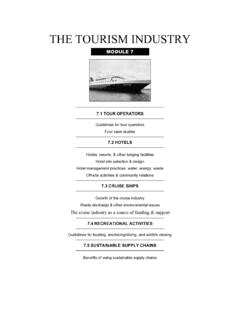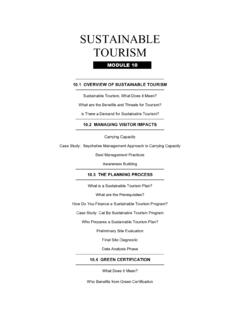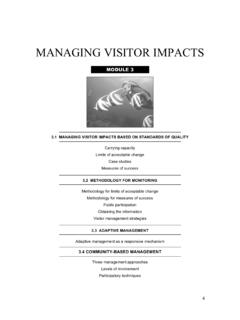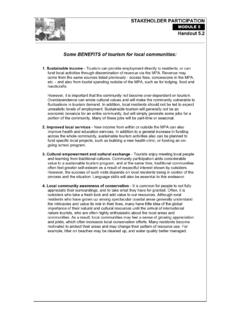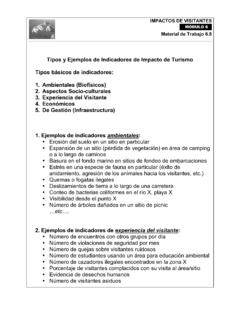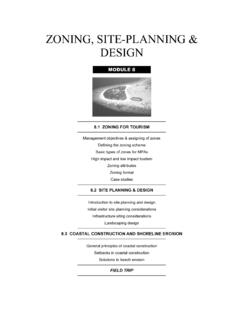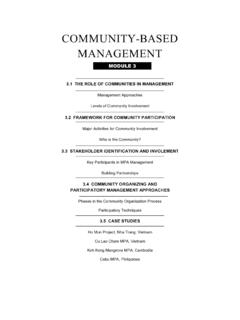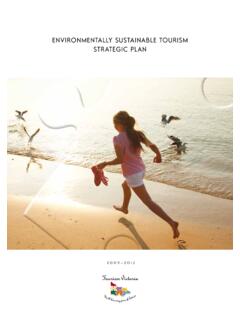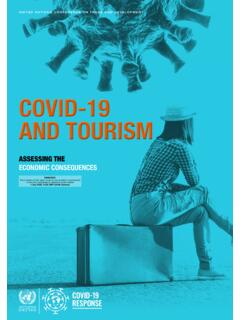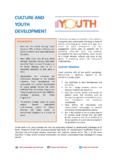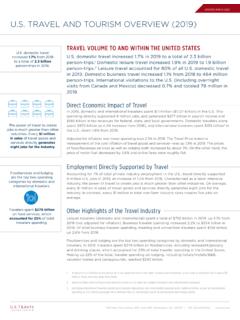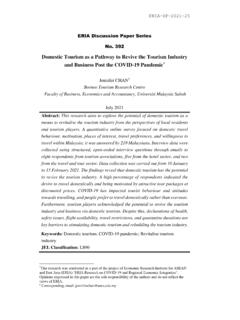Transcription of QUESTIONNAIRE: UNDERSTANDING THE CONCEPT OF …
1 SUSTAINABLE tourism CONCEPTS Handout MODULE 1 Please fill these out, use them for discussion, and then turn them in to your instructor. questionnaire : UNDERSTANDING THE CONCEPT OF SUSTAINABLE tourism 1. Do you believe you understand the CONCEPT of sustainable tourism ? very familiar somewhat familiar unfamiliar 2. Do you believe natural resource protection and tourism can be compatible? strongly agree agree don't know disagree strongly disagree 3. Do you believe protection of local heritage and tourism can be compatible? strongly agree agree don't know disagree strongly disagree 4. Do you believe that well-managed attractions such as your MPA, maintained in their natural state, are important to attracting tourism ?
2 Strongly agree agree don't know disagree strongly disagree 5. Do you believe the community would benefit from developing a sustainable tourism framework? strongly agree agree don't know disagree strongly disagree 6. Do you believe there is a demand for sustainable tourism in and around your MPA? strongly agree agree don't know disagree strongly disagree 7. If you disagree with #6, do you believe a demand for sustainable tourism could be developed for your MPA? strongly agree agree don't know disagree strongly disagree SUSTAINABLE tourism CONCEPTS Handout MODULE 1 tourism Demand in Asia, 2004-2005 millions of %growth %growth arrivals, 2004 2004 2005 North-east Asia China (mainland)
3 41,761 Hong Kong 13,655 Japan 6,138 Korea 5,818 Macao 8,324 Taiwan 2,950 South-East Asia Cambodia 1,055 Indonesia 5,321 (tsunami/Bali bombing) Lao 236 Malaysia 15,703 Myanmar 242 Philippines 2,291 Singapore (no data) Thailand 11,737 (tsunami)
4 Vietnam 2,928 South Asia Bhutan 9 India 3,457 Maldives 617 (tsunami) Nepal 360 (political instability) Sri Lanka 566 (tsunami) Preliminary trends from first half of 2006: Northeast Asia overall Southeast Asia overall South Asia overall Source: World tourism Organization UNITED NATIONSGLOBAL CODE OF ETHICSFOR TOURISMR esolution adopted by the General Assembly21 December 2001A / R E S / 5 6 / 2 1 2 Global Code of Ethics for To u r i s mThe General Assembly,Recalling its resolution 32/156 of 19 December 1977, by which it approved theA g reement on Cooperation and Relationships between the United Nations and theWorld tourism Org a n i z a t i o n ,R e a ff i rm i n gparagraph 5 of its resolution 36/41 of 19 November 1981, in which it deci-ded that the World tourism Organization might participate, on a continuing basis, inthe work of the General Assembly in areas of concern to that org a n i z a t i o n.
5 R e c a l l i n gthe Manila Declaration on World tourism of 10 October 1980 adoptedunder the auspices of the World tourism Org a n i z a t i o n ,1the Rio Declaration onE n v i ronment and Development2and Agenda 213adopted at the United NationsC o n f e rence on Environment and Development on 14 June 1992, and taking note ofthe Amman Declaration on Peace through tourism adopted at the Global Summit onPeace through tourism on 11 November 2000,4 Consideringthat the Commission on Sustainable Development, at its seventh ses-sion, held in April 1999, expressed interest in a global code of ethics for tourismand invited the World tourism Organization to consider the participation ofinformed major groups in the development, implementation and monitoring ofits globlal code of ethics for tourism ,5R e c a l l i n gits resolution 53/200 of 15 December 1998 on the proclamation of 2002 asthe International Year of Ecotourism, in which, inter alia, it re a ff i rmed Economic andSocial Council resolution 1998/40 of 30 July 1998, recognizing the support of theWorld tourism Organization for the importance of ecotourism, in particular the desig-nation of the year 2002 as the International Year of Ecotourism.
6 In fostering betterunderstanding among peoples every w h e re, in leading to greater awareness of therich heritage of various civilizations and in bringing about a better appreciation of thei n h e rent values of diff e rent cultures, thereby contributing to the strengthening ofworld peace,R e c o g n i z i n gthe important dimension and role of tourism as a positive instru m e n tt o w a rds the alleviation of poverty and the improvement of the quality of life for allpeople, its potential to make a contribution to economic and social development,especially of the developing countries, and its emergence as a vital force for the pro-motion of international UNDERSTANDING , peace and pro s p e r i t y,1.
7 Takes note with interest of the Global Code of Ethics for tourism adopted at thet h i rteenth session of the General Assembly of the World tourism Org a n i z a t i o n ,6w h i c houtlines principles to guide tourism development and to serve as a frame of re f e re n-ce for the diff e rent stakeholders in the tourism sector, with the objective of minimi-zing the negative impact of tourism on environment and on cultural heritage whilemaximizing the benefits of tourism in promoting sustainable development andp o v e rty alleviation as well as UNDERSTANDING among nations;2. Emphasizes the need for the promotion of a responsible and sustainable tou-rism that could be beneficial to all sectors of society;3.
8 Invites Governments and other stakeholders in the tourism sector to consider intro-ducing, as appropriate, the contents of the Global Code of Ethics for tourism in re l e-vant laws, regulations and professional practices, and, in this re g a rd, recognizes witha p p reciation the eff o rts made and measures already undertaken by some States;4. Encourages the World tourism Organization to promote effective follow-up to theGlobal Code of Ethics for tourism , with the involvement of relevant stakeholders inthe tourism sector;5. Requests the Secre t a ry-General to follow up developments related to the imple-mentation of the present resolution based on the re p o rts of the World To u r i s mO rganizaion and to re p o rt thereon to the General Assembly at its fifty-ninth , annex, appendix of the United Nations Conference on Environment and Development, Rio de Janeiro, 3-14 June 1992 (United Nations publications, Sales No.)
9 And corrigenda), vol. I: Resolutions adopted by the Conference, resolution 1, annex , annex A/55 Official Records of the Economic and Social Council, 1999, Supplement No. 9 (E/1999/29), decision 7/36 See E/2001/61, CODE OF ETHICSFOR tourism adopted by resolution A/RES/406(XIII) atthe thirteenth WTO General Assembly(Santiago, Chile, 27 September -1 October 1999).PREAMBLEWe, Members of the World TourismO rganization (WTO), re p re s e n t a-tives of the world tourism industry,delegates of States, terr i t o r i e s ,enterprises, institutions and bodiesthat are gathered for the GeneralAssembly at Santiago, Chile on thisfirst day of October 1999,R e a s s e rt i n gthe aims set out in Art i c l e3 of the Statutes of the World To u r i s mO rganization, and aware of the deci-sive and central role of thisO rganization, as recognized by theGeneral Assembly of the UnitedNations, in promoting and developingtourism with a view to contributing toeconomic development, intern a t i o n a lunderstanding, peace, prosperity anduniversal respect for, and observ a n c eof.
10 Human rights and fundamentalf reedoms for all without distinction asto race, sex, language or re l i g i o n ,F i rmly believingthat, through thed i rect, spontaneous and non-media-tized contacts it engenders betweenmen and women of diff e rent culture sand lifestyles, tourism re p resents avital force for peace and a factor offriendship and UNDERSTANDING amongthe peoples of the world,In keepingwith the rationale of re c-onciling environmental protection,economic development and the fightagainst poverty in a sustainable man-n e r, as formulated by the UnitedNations in 1992 at the Earth Summit of Rio de Janeiro and expressed inAgenda 21, adopted on that occasion,Taking into accountthe swift and con-tinued growth, both past and fore s e e-able, of the tourism activity, whetherfor leisure, business, culture, re l i g i o u sor health purposes, and its powerf u le ffects, both positive and negative, onthe environment, the economy andthe society of both generating andreceiving countries, on local communi-ties and indigenous peoples, as well ason international relations and trade,Aimingto promote responsible, sus-tainable and universally accessibletourism in the framework of theright of all persons to use their freetime for leisure pursuits or travelwith respect for the choices of soci-ety of all peoples.
